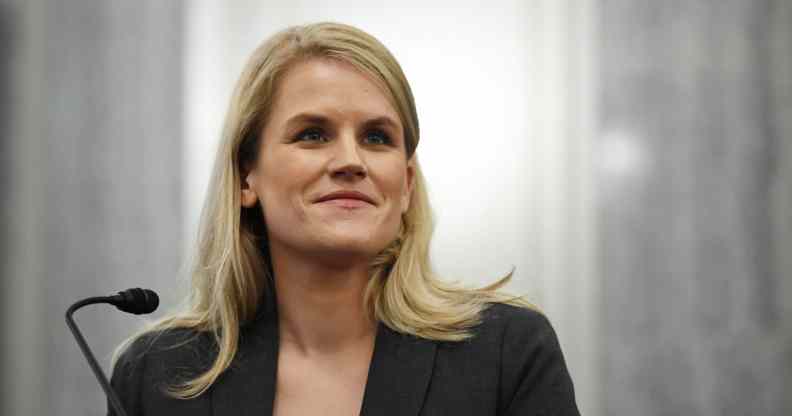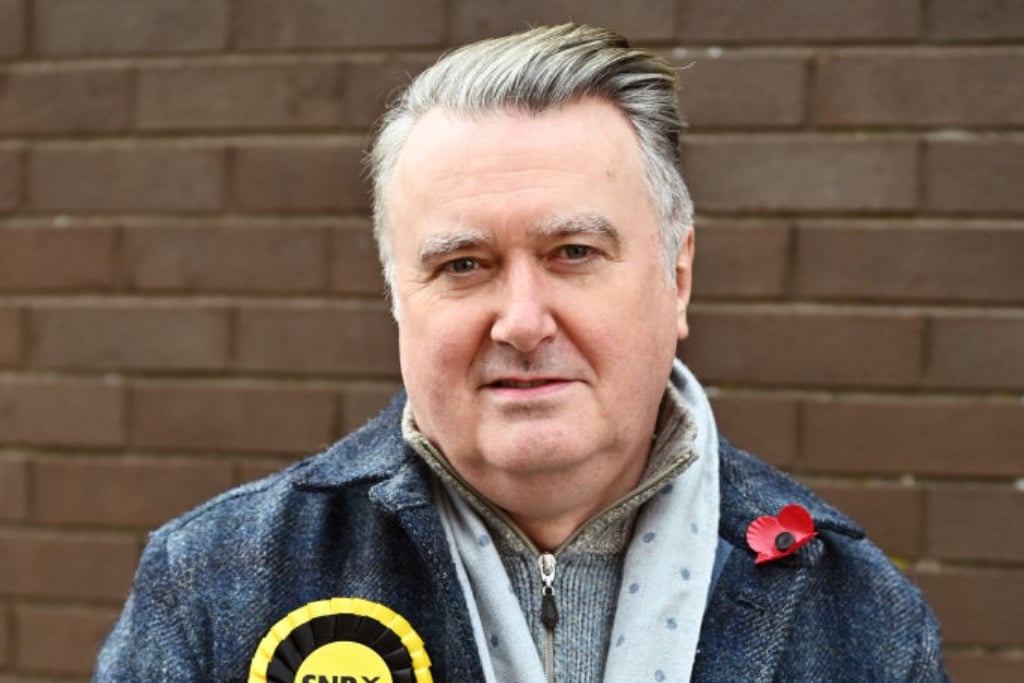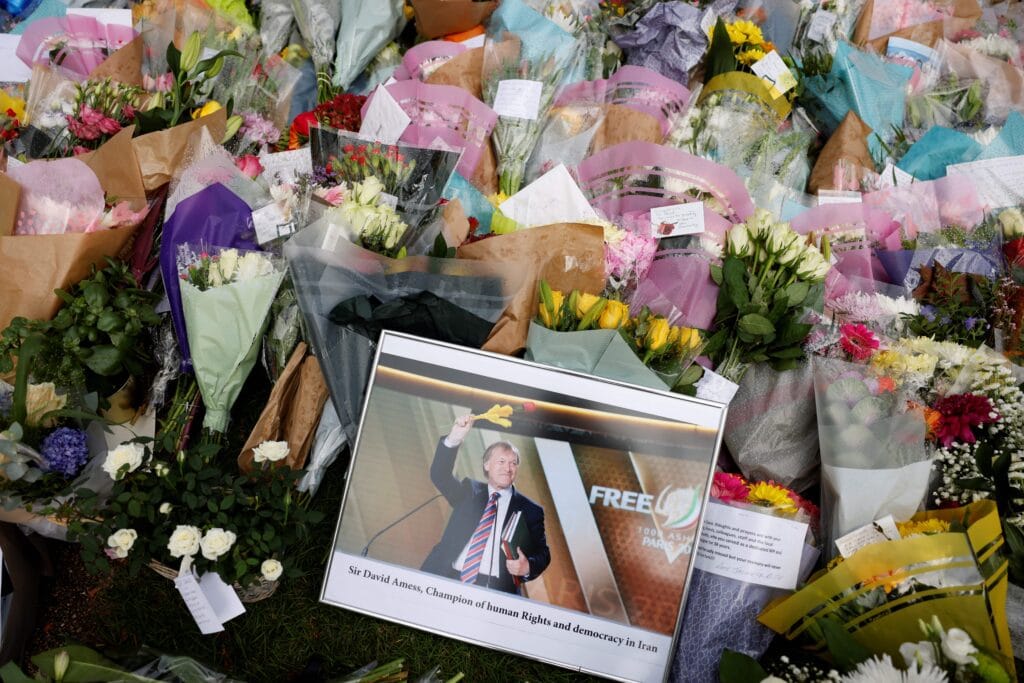MP who suffered disgusting homophobic abuse online asks whistleblower if Facebook is ‘evil’

Facebook whistleblower, Frances Haugen. (Matt McClain-Pool/Getty Images)
An SNP MP who faced biting homophobic abuse online grilled a Facebook whistleblower, citing his own experience of social media trolling.
The tragic killing of Tory MP David Amess has heightened concerns around online abuse, with the British government planning to toughen up social media regulations to curtail offensive content.
But as debate continues around the draft Online Safety Bill, which will place a duty of care on social media companies to protect users, SNP MP John Nicolson has said it does not do enough to tackle hatred.
During a session of a joint committee scrutinising the government’s plans on Monday (25 October), Nicolson quizzed Frances Haugen, a former Facebook manager who leaked dozens of documents around the service’s practices before resigning.

SNP MP John Nicolson. (Ken Jack/Getty)
Among the leaks, internal documents detailed Facebook’s failure to shield users from harmful content.
“On the social front, you pointed out that there might be differences between the UK and the US it’s not picking up,” the MP for Ochil and South Perthshire asked Haugen, according to The Herald.
Facebook‘s “safety systems”, Haugen said, are “designed for English”, meaning that they won’t necessarily pick up on the differences between British English and American English.
Nicholson recalled his own experience on Twitter “where – I am a gay man – was called a ‘greasy bender‘ and I reported it.”. Bender is a British homophobic slur.
“Twitter got back and told me that there’s nothing wrong with being called a ‘greasy bender’.”
Apparently calling someone a “greasy bender” involves no violation of @Twitter guidelines. Absurd. #lgbt pic.twitter.com/w2y8OgkWgJ
— JOHN NICOLSON M.P. (@MrJohnNicolson) January 17, 2019
Nicolson said he wrote back to Twitter quoting lines from the service’s community standards which demonstrated that the slur should have been deemed unacceptable.
“Somebody wrote back to me,” Nicolson continued, “presumably from California, telling me that it was absolutely acceptable.”
Twitter confirmed to PinkNews that the account has since been suspended from Twitter for violating the service’s abusive behaviour policy.
Haugen replied that such “bad actors” are pushing the limitations of social media platforms, Facebook included.
Asked by Nicolson if Facebook is “evil”, Haugen said: “I cannot see into the hearts of men.”
Facebook, Haugen added, is “overwhelmingly full of conscientious, kind and empathetic people who are embedded in systems with bad incentive”.
“And there is a real pattern of people who are willing to look the other way are promoted more than people who raise alarms”.
A wave of revelations have rocked Facebook after the leaked Facebook Papers, a cache of internal documents, revealed a damning picture of a company that has prioritised profits over its 2.9 billion users’ safety.
Disclosed to American regulators and Congress, the scores of internal research papers, slide decks, presentations and memos showed how the company’s artificial intelligence programs often fail to spot hate speech and abuse.
The number of human moderators, meanwhile, is being cut down.
Many within the company sought to raise alarms about this, the papers showed, but Facebook’s leadership responded with indifference.
How Facebook works means that “anger and hate is the easiest way to grow” on the platform, Haugen told MPs.

The death of Tory MP for South-on-Sea has sparked demand across the political divide for tougher social media regulation. (TOLGA AKMEN/AFP via Getty Images)
“We are literally subsidizing hate on these platforms,” she told policymakers. “It is substantially cheaper to run an angry divisive ad than it is to run a compassionate, empathetic ad.”
Mark Zuckerberg, Facebook’s embattled boss, has shot down the leaks. “My view on what we are seeing is a coordinated effort to selectively use leaked documents to create a false picture about our company,” he told analysts during a third-quarter earnings call on Monday.
“Any honest account should be clear that these issues aren’t just about social media,” he added.
“That means that whatever Facebook does, we’re never going to solve them alone.”
Between 2015 and 2020, eight in 10 queer people suffered anti-LGBT+ hate crime and hate speech online, a report by anti-violence charity Gallup sound.
At least half of the queer community have experienced online abuse 10 or more times, while one-fifth have experienced it more than 100 times.
Of those who flag such abuse to social media companies and police, three out of four were left “dissatisfied” with the response.
“Contrary to what was discussed at the hearing, we’ve always had the commercial incentive to remove harmful content from our sites,” a Facebook spokesperson told PinkNews.
“People don’t want to see it when they use our apps and advertisers don’t want their ads next to it. That’s why we’ve invested $13 billion and hired 40,000 people to do one job: keep people safe on our apps.
“As a result, we’ve almost halved the amount of hate speech people see on Facebook over the last three quarters – down to just 0.05 per cent of content views.
“While we have rules against harmful content and publish regular transparency reports, we agree we need regulation for the whole industry so that businesses like ours aren’t making these decisions on our own. The UK is one of the countries leading the way and we’re pleased the Online Safety Bill is moving forward.”
A Twitter spokesperson told PinkNews: “We are committed to combating abuse motivated by hatred, prejudice or intolerance and when we identify accounts that violate any of the Twitter Rules, we take enforcement action.
“We are continuing to evaluate ways to more aggressively take enforcement action against such content and are working with partners to identify the biggest opportunities to do so.”

